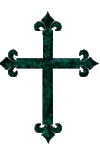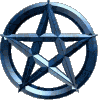



 |
 
|
 |
It is common thought, by historians and scholars, that by the seventh century the majority of the Germanic settlers in England had been converted from "paganism" to Christianity. Since evidence places the composition of Beowulf somewhere between the seventh and eleventh centuries, it is not unreasonable to assume that its author was influenced by both belief systems. Religious elements in the poem, however, seem to be a topic of hot debate within the circle of Old-English scholars.
The word "pagan," derived from the Latin word "paganus" meaning "country dweller" or "hick," has come to have a variety of meanings. These meanings range from "any non-Christian belief system" to any number of specific belief systems in existence today. Given this fact, the suggestion of Edward B. Irving, Jr., in his essay on the religious elements in Beowulf, of using the terms "secular" or "non-Christian," instead of "pagan," makes clarification of this topic much simpler. "We clearly do not know enough about truly pagan ethics," says Irving (Irving 180).
Christianity is a monotheistic religion, that is, a religion based on the belief in one "almighty" God. Therefore, a Christian reader does not have to delve too deeply into Beowulf to uncover the numerous familiar references. For instance, Beowulf, when describing his battle with Grendel's mother, says, "the Lord of Men allowed me to behold...an ancient sword shining on the wall"(Norton 1661). This seems to be a reference to the one true "Christian" God. Likewise, Hrothgar attributes Beowulf's wisdom and status to a one-and-only supreme being, saying, "It is a great wonder how Almighty God in His magnificence favors our race with rank and scope and the gift of wisdom"(Norton 1724).
This same Christian tone is heard when Hrothgar describes the the engravings on the hilt of the sword Beowulf uses to destroy Grendel's mother. Not only does he refer to this same "Amighty God," but he also alludes to the biblical story of Noah and the flood (Genesis 6.2-7):
|
...the old heirloom, on which was written the origin of ancient strife, when the flood, rushing water, slew the race of giants--they suffered terribly: that was a people alien to the Everlasting Lord (Donaldson 1684). |
The warrior code, which is apparent throughout Beowulf, is based on values that seem to conflict, in some ways, with Christian values. For instance, the importance placed on avenging the death of a kinsman, one aspect of the warrior code, is seen on numerous occasions. When Beowulf returns from slaying Grendel's mother, he exclaims, "I have avenged the evil deeds, the slaughter of Danes, as it was right to do" (Donaldson 1672). This completely contradicts the Christian teachings of "turning the other cheek," set forth in the New Testament of the Bible:
|
You have heard that it was said, 'An eye for an eye and a tooth for a tooth.' But I say to you, Do not resist one who is evil. But if anyone strikes you on the right cheek, turn to him the other also (Mathhew 5:38, Revised Standard Version) |
Another aspect of the warrior code is the importance of personal glory. Warriors are remembered, eternally, for the glorious deeds they performed. This is exemplified in Hrothgar's statement to Beowulf:
|
Lo, this may one say who works truth and right for the folk, recalls all things far distant, an old guardian of the land: that this earl was born a better man. Glory is raised up over the far ways--your glory over every people, Beowulf my friend (Donaldson 1793). |
Again, this contradicts the Christian value of meekness, expressed in the Christ's Sermon on the Mount:
|
Blessed are the poor in spirit, for theirs is the kingdom of heaven...Blessed are the meek, for they will inherit the earth (Matthew 5:14-16 Revised Standard Version). |
There are other "pagan," or "non-Christian" elements throughout Beowulf not appearing in our passage, such as descriptions of burial customs. Some scholars look deep into the translation of the Old English language version to speculate about other potential "pagan" references (see North 64). Others believe that the original poem was completely "pagan" in origin, and re-written to adhere to a more Christian standard. Regardless of the many speculations and differences of opinion, it is apparent, and commonly agreed that the author was influenced in some way by both belief systems.